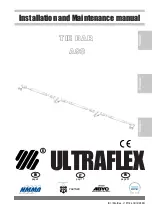
Open Plenum Array
3
To ensure a successful installation, the instructions in this manual should be read and adhered to. Failure to comply
with proper installation procedures may void the warranty.
Unit and System Identification Tags
Each array has a permanently affixed manufacturer’s engraved metal nameplate
containing the model number and individual serial number.
The tag shown is an example of an identification nameplate on the array. The
information provides general details about the fan, as well as containing specific
information unique to the unit. When contacting the local sales representative
with future needs or questions, please have the information on this label available.
Tags are mounted in an area which is clearly visible, usually on the side of the fan array.
Pre-Installation Information
Before installation, it is important to be certain the mounting surface will bear the operating weight of the unit. For
proper unit operation, it is also important that it be operated in a completely level position. Leveling shims may be
required for proper installation. See next page.
For further details on safety practices involving industrial and commercial fans, please refer to AMCA
Publication 410.
Moving Parts
All moving parts must have guards to protect personnel. Refer to local codes for requirements as to the number, type
and design. Fully secure the wheel before performing any maintenance. The wheel may start “free wheeling” even
if all electrical power has been disconnected. Before the initial start-up or any restart, check the following items to
make sure that they are installed and secure.
• Do not spin the wheel faster than the maximum cataloged fan RPM.
• Adjustments to fan speed significantly affects motor load. If the fan RPM is changed, the motor current should be
checked to make sure it is not exceeding the motor nameplate amps.
Air Pressure and Suction
In addition to the usual hazards associated with rotating machinery, arrays also create a dangerous suction at the
inlet. Special caution needs to be used when moving around an array, whether it is in operation or not. Before start-
up, make sure the inlet area is clear of personnel and loose objects.
General Information
Rigging and Lifting
Arrays are to be rigged and moved by the lifting brackets and/or lifting points provided or
by the skid when a forklift is used. Handle in such a manner as to keep from scratching or
denting. Damage may reduce the ability of array to resist corrosion.
• Use standard lifting and rigging practices. Use of a spreader bar is recommended.
•
ALL
lifting brackets on each component must be utilized at the same time.
CAUTION
Arrays should never be lifted by the shaft, motor,
guards or accessories.
Lifting Points
Damper

























